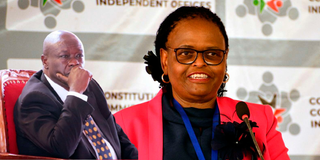Premium
Return to sender: CJ Koome constitutes same bench Gachagua sued to hear impeachment cases

Deputy President Rigathi Gachagua and Chief Justice of Kenya, Martha Koome.
Chief Justice Martha Koome has retained the same bench for the hearing of petitions challenging the impeachment of former Deputy President Rigathi Gachagua.
In a notice on Friday, Justice Koome named Justices Eric Ogola, Anthony Mrima and Dr Freda Mugambi to hear the petitions and directed the cases to be mentioned before the judges on May 29, for directions.
“Kindly take notice that the Honourable Chief Justice has empaneled a bench comprising of Hon Justice E. Ogola (Presiding), Hon Justice A. Mrima and Hon Lady Justice Dr F. Mugambi in the following petitions,” the notice to advocates stated.
Mr Gachagua had successfully challenged the appointment of the same judges by Deputy Chief Justice Philomena Mwilu, arguing that the powers to empanel judges were a preserve of the CJ.
Justices Daniel Musinga, Mumbi Ngugi and Francis Tuiyott ruled on May 9 that the duty to empanel a bench was reserved for the Chief Justice by the Constitution.
The judges held that assigning judges was not one of the administrative duties that the CJ can allocate or pass over to the DCJ.
“It has to be remembered that the duty to empanel is reserved for the Chief Justice by the Constitution, and we do not think it is one of those administrative duties that the Chief Justice can allocate or pass over to the Deputy Chief Justice by dint of section 5(2) of Judicial Service Act (JSA), the judges said.
Justice Koome had named the same bench to hear three petitions that were filed before Mr Gachagua was impeached.
And when the Senate confirmed the charges and impeached the former deputy president, more petitions were filed, among them two, which were filed before the High Court in Kerugoya, which granted orders stopping the replacement of Mr Gachagua, pending further directions.
Also Read: Gachagua’s big win, but no celebration yet: Why ex-DP still has to argue his cases afresh
Justice Richard Mwongo, sitting in Kerugoya, then forwarded the two files to the CJ for appointment of a bench to hear the cases, after ruling that the issues raised in the petitions were substantial questions of law that should be determined by a bench of more than one judge.
When the files were brought to Nairobi, the DCJ appointed the same judges on October 18, 2024, and forwarded the cases alongside another one filed in Nairobi to the judges, a decision that prompted Mr Gachagua’s team to protest.
Through senior counsel Paul Muite, Mr Gachagua questioned the powers of the DCJ to appoint judges to hear the cases.

Former Deputy President Rigathi Gachagua with lawyer Paul Muite at the High Court in Milimani on October 22, 2024.
Justices Ogola, Mrima and Mugambi dismissed the arguments, saying that the mandate exercised by the Chief Justice under Article 165(4) of the constitution, on appointment of benches, was an administrative function and the DCJ can assign judges when she is discharging any of the constitutional functions on behalf of the Chief Justice.
Not satisfied, Mr Gachagua headed to the Court of Appeal, where the court agreed with him that the DCJ had no such powers.
“It is the Chief Justice, and she alone, who can decide the number of judges to assign a matter. Similarly, it is only the Chief Justice who can decide which judge to assign to a bench, and this answers the related prayer that we direct that the Chief Justice excludes the three named judges from the bench to be constituted afresh,” said the judges.


